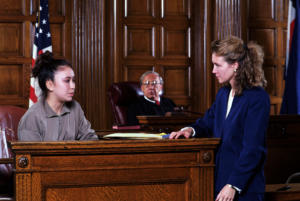If you are the defendant in a criminal prosecution in Tennessee, and you do not want to plead guilty, one of the most important decisions you must make is whether to opt for a jury trial or a trial by judge, also known as a bench trial. Given the potential consequences of a criminal trial, you will hopefully make this decision with the advice and guidance of an experienced criminal defense attorney. It also helps to familiarize yourself with some of the advantages and disadvantages of both options. With that in mind, a Murfreesboro criminal defense attorney at
Your Rights as a Defendant
As a defendant in a criminal prosecution, you have certain rights under both federal and state law. The 6th Amendment to the U.S. Constitution guarantees you the right to a trial by jury, stating “In all criminal prosecutions, the accused shall enjoy the right to a speedy and public trial, by an impartial jury of the state and district wherein the crime shall have been committed…” The Tennessee Constitution has a similar provision, found in Article I which provides “That the right of trial by jury shall remain inviolate, and no religious or political test shall ever be required as a qualification for jurors.” While you have the right to a trial by jury, you also have the right to waive that right and proceed to a trial by judge (bench trial).
Understanding a Jury Trial in a Tennessee Criminal Case
A jury trial involves a panel of citizens who are selected at random from the Tennessee DMV database to hear the evidence and determine the verdict. Through a process referred to as “voir dire,” both the prosecution and defense have a role in selecting which 12 citizens ultimately end up on the jury.
The jurors in a jury trial are responsible for evaluating testimony, reviewing evidence, and applying the law as instructed by the judge. The judge oversees the trial to ensure that all legal procedures are followed, but the jury ultimately decides whether the defendant is guilty or not guilty. To find the defendant guilty, the jurors must unanimously believe that the prosecution proved the defendant’s guilt beyond a reasonable doubt. If the jurors cannot reach a unanimous verdict, referred to as a “hung jury,” the judge may declare a mistrial, leading to the possibility of a retrial.
Understanding a Trial by Judge in a Tennessee Criminal Case
A trial by judge, or bench trial, means that a single judge determines the outcome of the case. The judge listens to the evidence, assesses the credibility of witnesses, and applies the law to render a verdict. Unlike in a jury trial, there are no jurors involved in the decision-making process. Bench trials are typically shorter than jury trials because they do not require jury selection, instructions, or deliberations. They are often preferred in cases where the legal issues are complex or when the defendant believes that a judge will be less influenced by emotional arguments than a jury might be.
What Factors Should Be Considered When Choosing a Trial by Jury or Judge?
Because every criminal prosecution is unique, there is no simple formula for deciding whether a trial by jury or judge is likely to be more beneficial; however, there are some factors that are typically considered, including:
- Complexity of the evidence: When the evidence that is likely to be presented is complex in nature (highly scientific or complicated), jurors tend to tune out. You also run the risk that the jurors simply cannot understand the evidence.
- Complexity of the law: If the defense is based on a complex interpretation of the law or on what jurors may see as a “technicality,” it can be wise to choose a trial by judge.
- Emotional appeal: When the law is on the side of the prosecution, but there is an emotional appeal to be made, a trial by jury may be the better choice. Judges, unlike jurors, are unlikely to be persuaded by emotional appeals.
- Defendant’s characteristics: Although the defendant’s appearance, history, or personality should not be considered as evidence by jurors (in most cases), jurors are human beings. As such, it is always wise to consider how jurors will view the defendant when deciding which type of trial is the best option.
Consulting with an experienced criminal defense attorney is essential to making an informed decision when deciding which type of trial will maximize your chances of a favorable outcome.
Contact a Murfreesboro Criminal Defense Attorney
If you have been charged with a criminal offense in Tennessee, consult with an experienced Murfreesboro criminal defense attorney at Bennett | Michael | Hornsby as soon as possible to discuss your legal options. Contact the team today by calling 615-898-1560 to schedule your free appointment.
- Understanding the Medicaid Estate Recovery Program in Tennessee - March 27, 2025
- Trial By Jury or Judge: Understanding Your Options in a Tennessee Criminal Case - March 21, 2025
- Can an Adoptee Access Their Adoption Records in Tennessee? - March 7, 2025




